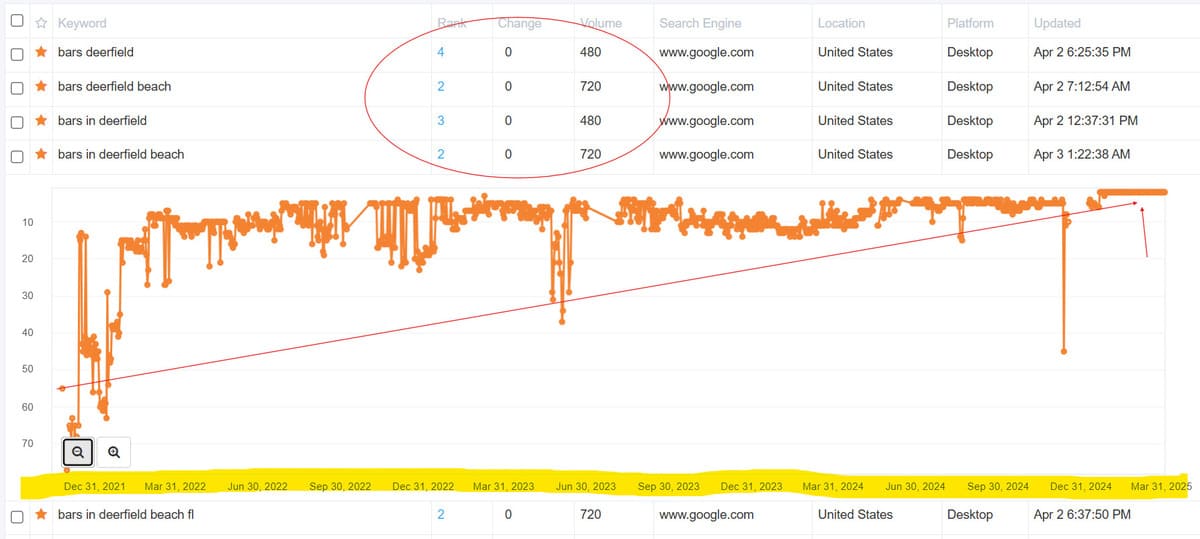Small businesses are becoming increasingly dependent on local SEO.
Think of your own life and how often you search for something “near you.” Pizza near me, haircut near me, coffee near me, furniture near me—you get the picture.
Each time you search for a business online, you’re conducting a local search. Local SEO for small businesses is crucial because people tend to go online before they set foot in a store.
We’re going to talk about some of the tools your small business should use to optimize for local searches.
The Basics of SEO
Let’s assume that you aren’t familiar with the ins and outs of SEO.
It’s certainly a specific type of knowledge, and there’s nothing wrong with not knowing anything about it.
At the same time, now is an excellent opportunity for your business to get the boost it needs. We’ll talk about SEO in general, then dig into some of the deeper elements of a good SEO campaign.
What Is SEO?
Search engine optimization is the method of tailoring your website and marketing efforts to rank highly in search engine results pages (SERPs).
If you can rank highly, you can attract more customers and web traffic. This process is carried out by understanding what search engine algorithms are and how to appeal to them.
Search engines use an algorithm to determine which sites in the sea of the internet are most relevant to the keyword search of a user.
So, if Tim searches “fun orange juice recipes,” those terms are run against all the sites on Google’s index, the most relevant sites are stripped down to the most relevant few, and those are the sites Tim sees in his results.
But how do those lucky sites end up at the top of the results? What are they doing better than everyone else?
Let’s investigate.
Key Points on Local SEO for Small Businesses
Of the hundreds of search factors that search engines use, there are a few that rise to the top as most important.
Focusing on the specifics of optimization, though, may not be the best attitude to have. It’s important to think of the search engine’s goals before your own—they need to produce the most relevant results to users so that users keep using that search engine.
It’s just like any other business. They provide a good service to users and users come back for more. So, if search engines are simply trying to identify the most quality sites, your first aim should be quality of content.
In other words, don’t slack on quality just to cover all your bases. The more effort you put into solving user problems and providing value, the higher your rankings will eventually be.
On top of that, small businesses should focus on the following to rank highly:
1. Social Media Presence
A healthy social media presence will drive traffic back to your actual website.
So long as you have the appropriate links back to your sales pages, people who are curious about you will be directed back to your site.
Social media is going to generate local buzz before your website sees high rankings as well. So, before you start driving in traffic through your other optimization efforts, make sure you have profiles on each prominent social media platform.
2. Keyword Optimization
Keyword research and optimization is the lifeblood of any kind of search engine optimization.
The process entails researching which keywords are popular in your area and your target demographic, then optimizing specific pages for them.
Your goal should be to find keywords and phrases that are popular and don’t have a lot of tough competition. It’s difficult to find the perfect ratio of search volume and competition, though, so you’ll have to choose as best you can. There are platforms available to help you do this.
When you have a term in mind, you’ll want to embed it into whatever content you’re making at the moment.
This brings us to our next point.
3. Content Creation
You should aim to create content (whether it be blog posts, videos, or articles) and share that content across your social media platforms.
Content should be created in response to the keyword research that you’ve done. So, you might find that “dinner in Nashville” is a popular keyword that will work for you. In response to that, create an article that is centered around the idea of dinner in Nashville, using the keyword an appropriate amount within the copy.
All your content should be created in this way at first. The content has been researched, addresses a current user problem, and is likely to show up in local searches because of the keyword volume.
Additionally, as more people engage with your social media postings, the blog posts or articles that your sharing will get higher rankings in the SERPs. While Google doesn’t claim social media engagement as a ranking factor, the traffic that comes to your site from social media certainly helps rankings.
4. Business Reviews
If there’s anything that lets a search engine know a site is valuable, it’s a recommendation from an actual user.
The more positive reviews you get, the more your rankings skyrocket.
It’s important to remember that a little goes a long way when it comes to local SEO. It’s likely that your local competition isn’t optimizing effectively, so any distinct tactic you use will boost you in “near me” searches.
So, incentivize your customers in-store and online to leave you an online review. Whether this happens on Google Business Reviews or Yelp doesn’t matter—it simply matters that you have feedback.
Make sure you have accounts and are listed on all prominent review sites.
Does SEO Sound Helpful?
Conducting local SEO for small businesses is a must in this day and age.
The process isn’t extremely difficult, either—that is, if you want to see marginal results. If you want to see huge results, you might have to consult with the professionals.
Contact us to learn more about working with SEO professionals.





